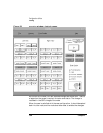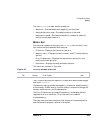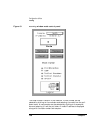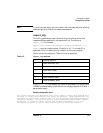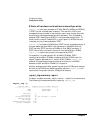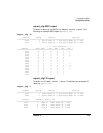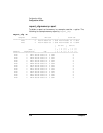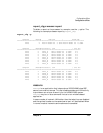
112 Chapter 5
Configuration utilities
Configuration utilities
Effects of hardware and software deconfiguration
report_cfg counts all processors, STACs, SMACs, SAGAs and ERACs
if POST has not marked them as empty. This results in ASICs and
processors being included in the summary count even though they may
have failed or have been deconfigured by software. This is necessary
because POST deconfigures STACs in a single node configuration. To
allow the tool to count these ASICs, it must report all ASICs that are
installed, not just those enabled by POST.
report_cfg includes all DIMMs that POST has not marked as empty. If
the user deconfigures a SMAC with software or the SMAC fails the
POST selftest, POST marks the DIMMs on that SMAC as empty. If
POST has written valid size information into the BCM for a DIMM,
report_cfg reports the physical size reported by POST.
For example, if a node has both 80- and 88-bit DIMMs, POST
reconfigures the 88-bit DIMMs to behave as 80-bit DIMMs, and the
system logically behaves as if it has all 80-bit DIMMs. report_cfg,
however, distinguishes (using the physical attribute in the BCM)
between the 80- and 88-bit DIMMs in its reports.
Another example would be a system that contains 16 GBytes of memory
but half of the DIMMs are deconfigured by software. report_cfg still
reports that the system contains 16 Gbytes of memory.
report_cfg summary report
To obtain a system summary report, use the -s option for the command.
The following is a sample summary report by report_cfg:
report_cfg -s
Complex name Complex serial number Node ID
------------------ --------------------- -------
hw4a USR1234567 0
hw4a USR1234567 2
Cabinets: 2
Processors: 30
Processor boards: 30 (30 singles, 0 duals)
Memory boards: 16
TAC chips: 16
Enabled Memory (Mb): 8192
88-bit 128Mbyte: 112



